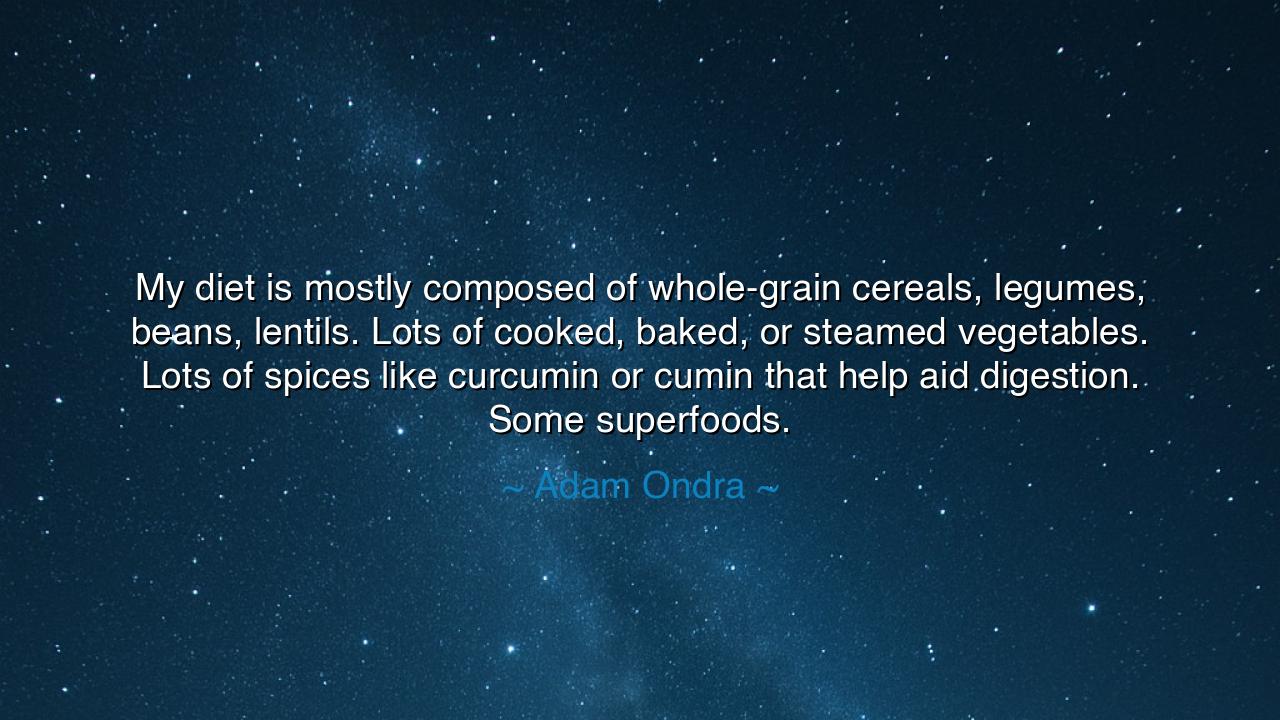
My diet is mostly composed of whole-grain cereals, legumes
My diet is mostly composed of whole-grain cereals, legumes, beans, lentils. Lots of cooked, baked, or steamed vegetables. Lots of spices like curcumin or cumin that help aid digestion. Some superfoods.






In the annals of history, there are many stories of warriors who, in their pursuit of greatness, paid heed to the most essential truth: what we eat shapes who we are. Adam Ondra, the modern-day champion climber, speaks of a diet rooted in wisdom, one that honors both the body and the spirit. "My diet is mostly composed of whole-grain cereals, legumes, beans, lentils. Lots of cooked, baked, or steamed vegetables. Lots of spices like curcumin or cumin that help aid digestion. Some superfoods." These humble words are not just a description of his sustenance, but a testament to the timeless wisdom passed down through the ages: that true strength, whether in body or in spirit, is cultivated through nourishment.
In the ancient world, the great philosophers and healers understood that the body is a temple, and in order to sustain the strength of the body, one must feed it not with excess or indulgence, but with the foods that honor its true nature. The Greeks, in their pursuit of the highest virtues, often sought a simple and balanced diet. Hippocrates, the father of medicine, famously said, "Let food be thy medicine and medicine be thy food." In these words lies the essence of Ondra’s diet—a path that blends the wisdom of the ancients with the practicality of the modern world. Like Hippocrates, Ondra recognizes that the body requires more than just fuel; it needs nourishment, the kind that empowers, heals, and fortifies.
The foods Ondra chooses are as ancient as they are timeless: whole-grain cereals, legumes, beans, and lentils—all staples of traditional diets known for their sustaining energy and nutrient density. These are the foods that have nourished civilizations for centuries, from the grains of the Indus Valley to the lentils and legumes of the ancient Mediterranean. The humble grain, the legume, the lentil—these were the foundations of strength for the ancient laborers, the warriors, and the wise. They provided the body with lasting energy, not fleeting sustenance. And in choosing these foods, Ondra honors this tradition, understanding that the true fuel for greatness lies not in empty calories but in the foods that build strength over time.
Yet, it is not just the nutritional value of these foods that Ondra embraces, but also the ancient practice of cooking, baking, and steaming. These methods, handed down through the ages, allow the body to digest and assimilate nutrients in their purest, most accessible forms. The ancient Egyptians, the Romans, and the Greeks all understood the power of food that had been prepared with care, food that had been transformed through heat to release its full potential. When Ondra speaks of his love for cooked vegetables, he is echoing the wisdom of these great civilizations, understanding that it is not enough to eat; one must eat in a way that respects the process of digestion and the body's natural rhythms.
The use of spices like curcumin and cumin further connects Ondra’s diet to the ancient world. These spices, revered in cultures from India to North Africa, were not only used to enhance flavor but to aid in the healing and digestion of the body. Curcumin, a compound found in turmeric, has long been hailed for its powerful anti-inflammatory properties, while cumin has been used for thousands of years to aid in digestion and to balance the body. These spices, simple yet profound, remind us that food is not just nourishment but medicine—a tool for maintaining health, vitality, and strength.
Ondra’s inclusion of superfoods further aligns his choices with the ancient understanding that food is both sustenance and medicine. The term “superfood” may be of modern coinage, but the concept is ancient. The ancient Aztecs revered the chia seed as a source of strength for their warriors, just as the ancient Chinese used ginseng for its powerful energizing properties. Superfoods, in their essence, are foods that carry a concentrated dose of the earth’s energy, offering more than just nutrition—they offer vitality, focus, and strength. Ondra’s selection of such foods is a reminder that what we eat has the power to transcend mere sustenance; it can elevate the body, fortify the mind, and feed the spirit.
The lesson here is one of profound simplicity and power. To be truly strong, whether in body or spirit, is not to seek indulgence, but to seek the foods that nourish us in a way that honors the balance of the earth and the body. Ondra’s diet is not merely about what is eaten, but how it is chosen—with wisdom and reverence for the ancient practices that have stood the test of time. The message is clear: nourish your body with the foods that sustain, heal, and fortify. Honor the wisdom of the ancients and the power of food as medicine. And above all, remember that strength, true strength, comes from a life lived in balance—with each meal a step towards greater vitality, health, and well-being.
So, dear reader, let us look to Ondra’s choices and the ancient wisdom that underpins them. Let us remember that the food we consume is not merely sustenance for the moment, but a foundation for the life we wish to lead. Seek the balance that comes from whole grains, legumes, vegetables, spices, and superfoods—foods that not only nourish the body but empower the soul. As the ancients taught, let food be your medicine, and let that medicine guide you toward the path of strength, health, and wisdom.






AAdministratorAdministrator
Welcome, honored guests. Please leave a comment, we will respond soon